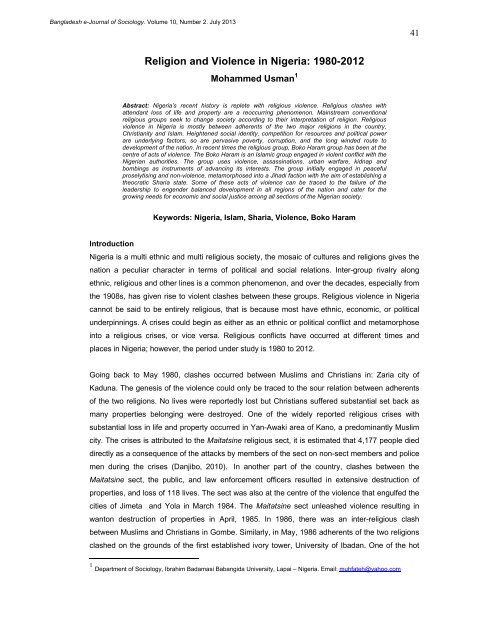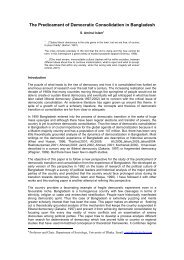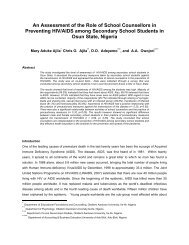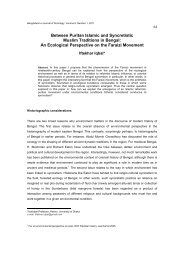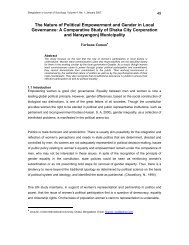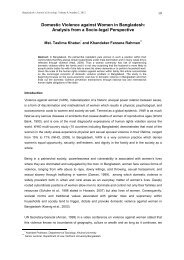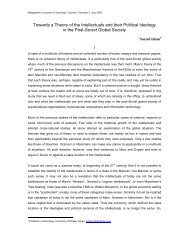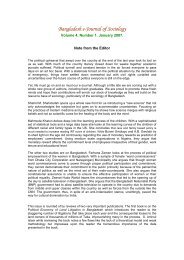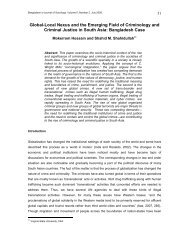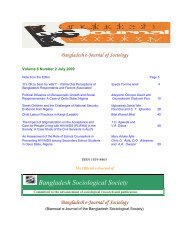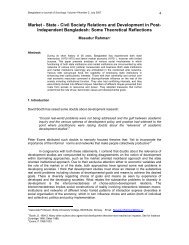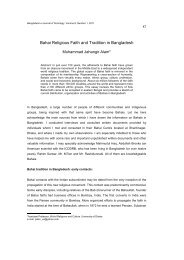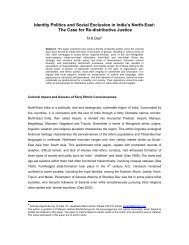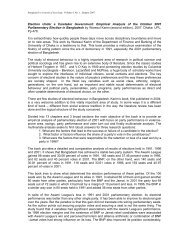Religion and Violence in Nigeria - Bangladeshsociology.org
Religion and Violence in Nigeria - Bangladeshsociology.org
Religion and Violence in Nigeria - Bangladeshsociology.org
Create successful ePaper yourself
Turn your PDF publications into a flip-book with our unique Google optimized e-Paper software.
Bangladesh e-Journal of Sociology. Volume 10, Number 2. July 201341<strong>Religion</strong> <strong>and</strong> <strong>Violence</strong> <strong>in</strong> <strong>Nigeria</strong>: 1980-2012Mohammed Usman 1Abstract: <strong>Nigeria</strong>’s recent history is replete with religious violence. Religious clashes withattendant loss of life <strong>and</strong> property are a reoccurr<strong>in</strong>g phenomenon. Ma<strong>in</strong>stream conventionalreligious groups seek to change society accord<strong>in</strong>g to their <strong>in</strong>terpretation of religion. Religiousviolence <strong>in</strong> <strong>Nigeria</strong> is mostly between adherents of the two major religions <strong>in</strong> the country,Christianity <strong>and</strong> Islam. Heightened social identity, competition for resources <strong>and</strong> political powerare underly<strong>in</strong>g factors, so are pervasive poverty, corruption, <strong>and</strong> the long w<strong>in</strong>ded route todevelopment of the nation. In recent times the religious group, Boko Haram group has been at thecentre of acts of violence. The Boko Haram is an Islamic group engaged <strong>in</strong> violent conflict with the<strong>Nigeria</strong>n authorities. The group uses violence, assass<strong>in</strong>ations, urban warfare, kidnap <strong>and</strong>bomb<strong>in</strong>gs as <strong>in</strong>struments of advanc<strong>in</strong>g its <strong>in</strong>terests. The group <strong>in</strong>itially engaged <strong>in</strong> peacefulproselytis<strong>in</strong>g <strong>and</strong> non-violence, metamorphosed <strong>in</strong>to a Jihadi faction with the aim of establish<strong>in</strong>g atheocratic Sharia state. Some of these acts of violence can be traced to the failure of theleadership to engender balanced development <strong>in</strong> all regions of the nation <strong>and</strong> cater for thegrow<strong>in</strong>g needs for economic <strong>and</strong> social justice among all sections of the <strong>Nigeria</strong>n society.Keywords: <strong>Nigeria</strong>, Islam, Sharia, <strong>Violence</strong>, Boko HaramIntroduction<strong>Nigeria</strong> is a multi ethnic <strong>and</strong> multi religious society, the mosaic of cultures <strong>and</strong> religions gives thenation a peculiar character <strong>in</strong> terms of political <strong>and</strong> social relations. Inter-group rivalry alongethnic, religious <strong>and</strong> other l<strong>in</strong>es is a common phenomenon, <strong>and</strong> over the decades, especially fromthe 1908s, has given rise to violent clashes between these groups. Religious violence <strong>in</strong> <strong>Nigeria</strong>cannot be said to be entirely religious, that is because most have ethnic, economic, or politicalunderp<strong>in</strong>n<strong>in</strong>gs. A crises could beg<strong>in</strong> as either as an ethnic or political conflict <strong>and</strong> metamorphose<strong>in</strong>to a religious crises, or vice versa. Religious conflicts have occurred at different times <strong>and</strong>places <strong>in</strong> <strong>Nigeria</strong>; however, the period under study is 1980 to 2012.Go<strong>in</strong>g back to May 1980, clashes occurred between Muslims <strong>and</strong> Christians <strong>in</strong>: Zaria city ofKaduna. The genesis of the violence could only be traced to the sour relation between adherentsof the two religions. No lives were reportedly lost but Christians suffered substantial set back asmany properties belong<strong>in</strong>g were destroyed. One of the widely reported religious crises withsubstantial loss <strong>in</strong> life <strong>and</strong> property occurred <strong>in</strong> Yan-Awaki area of Kano, a predom<strong>in</strong>antly Muslimcity. The crises is attributed to the Maitats<strong>in</strong>e religious sect, it is estimated that 4,177 people dieddirectly as a consequence of the attacks by members of the sect on non-sect members <strong>and</strong> policemen dur<strong>in</strong>g the crises (Danjibo, 2010). In another part of the country, clashes between theMaitats<strong>in</strong>e sect, the public, <strong>and</strong> law enforcement officers resulted <strong>in</strong> extensive destruction ofproperties, <strong>and</strong> loss of 118 lives. The sect was also at the centre of the violence that engulfed thecities of Jimeta <strong>and</strong> Yola <strong>in</strong> March 1984. The Maitats<strong>in</strong>e sect unleashed violence result<strong>in</strong>g <strong>in</strong>wanton destruction of properties <strong>in</strong> April, 1985. In 1986, there was an <strong>in</strong>ter-religious clashbetween Muslims <strong>and</strong> Christians <strong>in</strong> Gombe. Similarly, <strong>in</strong> May, 1986 adherents of the two religionsclashed on the grounds of the first established ivory tower, University of Ibadan. One of the hot1 Department of Sociology, Ibrahim Badamasi Babangida University, Lapai – <strong>Nigeria</strong>. Email: muhfateh@yahoo.com
Bangladesh e-Journal of Sociology. Volume 10, Number 2. July 201342beds of religious crises <strong>in</strong> <strong>Nigeria</strong> is Kaduna State; <strong>in</strong> March, 1987,there were clashes betweenMuslims <strong>and</strong> Christians <strong>in</strong> the College of Education, Kafanchan; the crises has left a l<strong>in</strong>ger<strong>in</strong>gacrimonious relationship between adherents of the two faiths that has lasted to date. The burn<strong>in</strong>gof Mosques by Christian Kajes <strong>and</strong> retaliatory attacks by Muslims had far reach<strong>in</strong>g effects;neighbour<strong>in</strong>g towns like Kats<strong>in</strong>a, Funtua, Zaria, Gusau were engulfed by a wave of religious riots.Many lives were lost, as had become the norm for such occurrences.Like clerics, young people <strong>and</strong> students are not left out of religious violence, <strong>in</strong> KadunaPolytechnic <strong>in</strong> Kaduna State it is was common for <strong>in</strong>tra <strong>and</strong> <strong>in</strong>ter religious riots to break out everywhile. In some cases of religious violence, sects have been the source of violence, for <strong>in</strong>stance,the Shi’ite sect under the auspices of Islamic Movement of <strong>Nigeria</strong> embarked on peaceful protestsaga<strong>in</strong>st what it called an offensive <strong>and</strong> blasphemous publication by a magaz<strong>in</strong>e; the march wassubverted by street urch<strong>in</strong>s consequently end<strong>in</strong>g <strong>in</strong> violence (Adesoji, 2010; CSMN). Others arethe acrimonious, nationwide debate on Sharia (Islamic law) at the Constituent Assembly <strong>in</strong>October/November 1988, the Bayero University crisis of 1989, the Bauchi/Kats<strong>in</strong>a riots of March,1991, the Zangon-Kataf riot of May 1992, the Kano civil disturbance of December 1991 <strong>and</strong> theJos crisis of April 1994 (Imo 1995: 21-23; Ibrahim 1997: 512-516; Enwerem 1999: 124). Similarly,between 1999 <strong>and</strong> 2008, 28 other conflicts were reported, the most prom<strong>in</strong>ent be<strong>in</strong>g theShagamu conflict of July 1999 <strong>and</strong> the recurrent Jos crises of 2001, 2002, 2004 <strong>and</strong> 2008(Akaeze 2009). The <strong>in</strong>tractable Jos Ethno-religious crisis has recurred severally between 2008<strong>and</strong> January 2010; it rema<strong>in</strong>s a potentially explosive issue till date.Background to the Boko HaramOne of the major challenges faced by the nation <strong>in</strong> recent times is the outbreak of violent upris<strong>in</strong>gby a religious group locally called Boko Haram. The multi ethnic <strong>and</strong> religious nature of <strong>Nigeria</strong>nsociety, the high sensitivity to religious issues by <strong>Nigeria</strong>ns coupled with the long military rule arefactors identified as hav<strong>in</strong>g militarized the psyche of most <strong>Nigeria</strong>ns (Adesoji, 2010). But poignant<strong>and</strong> alarm<strong>in</strong>g issue is the attempt by adherents of various religions to forcefully impose a religiousideology on others. These attempts manifest a grow<strong>in</strong>g religious sensitivity as one of the mostreligious countries <strong>in</strong> the world, <strong>and</strong> the failure to effect deterrent measures <strong>in</strong> the past. Theeffects of heightened religious consciousness have had adverse social, political <strong>and</strong> economicconsequences on the nation. Apart from the carnage <strong>and</strong> destruction of property, the grow<strong>in</strong>gdistrust <strong>and</strong> animosities among <strong>Nigeria</strong>ns of different faiths <strong>and</strong> tribes, the issue of religiousviolence poses a threat to national security <strong>and</strong> cont<strong>in</strong>ued existence of the nation (IISS, 2011).The Boko Haram, prior to 2010, was largely an unknown group. They kept to themselves, a sortof micro state with<strong>in</strong> the larger <strong>Nigeria</strong>n state. Adesoji (2010:3), views the Boko Haram <strong>in</strong>surgencyas another forceful attempt to Islamise <strong>Nigeria</strong>. He ma<strong>in</strong>ta<strong>in</strong>s that it “was not the first forcefulattempt to impose a religious ideology on a secular <strong>Nigeria</strong>n society”; but the Boko Haram grouplike the rest of <strong>Nigeria</strong>ns advocates for change <strong>and</strong> responsible governance. The Boko Haram
Bangladesh e-Journal of Sociology. Volume 10, Number 2. July 201343approaches the issue of national development from the perspective of violent change. The grouphas taken the jihadi stance to deal<strong>in</strong>g with the challenges faced by the nation. This <strong>in</strong> no wayjustifies the groups approach to issues, but its agenda can be contextualised <strong>in</strong> the cont<strong>in</strong>uedunderdeveloped state of the society <strong>in</strong> spite of the potential it holds <strong>in</strong> terms of human <strong>and</strong> m<strong>in</strong>eralresources. Herskovits (2012), pert<strong>in</strong>ently po<strong>in</strong>ts out that “It was clear <strong>in</strong> 2009, as it is now (2012),that the root cause of violence <strong>and</strong> anger <strong>in</strong> both the north <strong>and</strong> south of <strong>Nigeria</strong> is endemicpoverty <strong>and</strong> hopelessness”; Bill Cl<strong>in</strong>ton adduced poverty as the ma<strong>in</strong> reason beh<strong>in</strong>d the violence(Abubakar <strong>and</strong> Wakili, 2012). The Boko Haram upris<strong>in</strong>g is significant, not only because itchallenges the legitimacy of the state through promot<strong>in</strong>g Islamic revivalism, but its actions are an<strong>in</strong>dictment of a nation that is fast be<strong>in</strong>g acknowledged to be a failed state. Government <strong>in</strong>eptitudehas become apparent with regular outbreaks of violence of many k<strong>in</strong>ds despite its cont<strong>in</strong>uouspromises to br<strong>in</strong>g them under control.Virtually all the religious crises that have occurred <strong>in</strong> <strong>Nigeria</strong> ended <strong>in</strong> some form of violence,either to persons or property. They have been expla<strong>in</strong>ed or justified by one reason or the otherdepend<strong>in</strong>g on the narrative of the group. Some acts of religious violence have underp<strong>in</strong>n<strong>in</strong>gs <strong>in</strong><strong>in</strong>tergroup rivalry for recognition by the state or access to political power <strong>and</strong> state resources(Albert 1999a: 285-286; Ladan 1999: 101). For <strong>in</strong>stance, several lives have been lost <strong>in</strong> Jos,Plateau State over the perceived threat posed by non-Christian <strong>and</strong> non-<strong>in</strong>digenous people likeHausa <strong>and</strong> Fulani who have settled <strong>in</strong> the state over the decades by the local ethnic group. Thesame argument applies to the Zangon-Kataf riots (Williams 1999; Ibrahim 1998: 39-66). Althoughalmost all the crises have been subsumed under religion <strong>and</strong> expla<strong>in</strong>ed by even some authors asreligious factors, it is apparent that other extraneous <strong>and</strong> underly<strong>in</strong>g factors like social identity,economic disequilibrium, poverty, <strong>and</strong> political power have all played a role (Ibrahim 1997: 521-524; Sulaiman 2008: 20-26). Ibrahim (1998) asserts that most, if not all ethno-religious criseshave beh<strong>in</strong>d them a perceived dom<strong>in</strong>ation by external or illegitimate groups.It should be noted that the northern zone of <strong>Nigeria</strong> has a high rate of poverty. Indicators ofdevelopment show a region that needs high <strong>in</strong>vestment to improve st<strong>and</strong>ards of liv<strong>in</strong>g; acomb<strong>in</strong>ation of factors like economic dislocation, deprivation, <strong>and</strong> <strong>in</strong>come <strong>in</strong>equalities, as well aspoverty cont<strong>in</strong>ue to pose challenges to the region. However, Boko Haram, spokesmen havewarned that their fight is an ideological one <strong>and</strong> not for worldly comforts, they admonish that thegroup cannot be <strong>in</strong>duced by material rewards like the Niger Delta militants. The group aligns itselfwith the Sunni sect of Islam but prom<strong>in</strong>ent Sunni Scholars <strong>and</strong> <strong>in</strong>tellectuals have challenged thegroup’s ideology <strong>and</strong> methods. The approach <strong>and</strong> methods of the Boko Haram has been likenedto that of the Maitats<strong>in</strong>e sect.The Boko HaramThe group popularly known as Boko Haram officially calls itself Jama’tu Ahlus Sunna LidawatiWal Jihad. It was identified to have metarmophosed over the decades <strong>and</strong> at one time was
Bangladesh e-Journal of Sociology. Volume 10, Number 2. July 201344refered to as Ahlusunna wal’ Jamma Hijra; the <strong>Nigeria</strong>n Taliban. It is also called the Yusufiyyanamed after the leader (Fasure 2009: 2; Omipidan 2009b: 48; Sunday Tribune 2009). There are<strong>in</strong>dications that the late leader Yusuf <strong>and</strong> maybe some elements may have belonged to the Shiitegroup under the leadership of Ibrahim El-Zakzakky, before a crisis that fissured it <strong>in</strong>to twoideological camps. The spl<strong>in</strong>ter group was Kano-based Jama’atul Tajdidi Islam (JTI) headed by aformer Zakzakky stalwart, Abubakar Mujahid; that was <strong>in</strong> the early 1990s. Yusuf ostensibly alsobecame a member of the JTI faction <strong>and</strong> was even appo<strong>in</strong>ted the amir (leader) for Borno State(Suleiman 2009: 19-23).The Shiites, officially known as the Islamic Movement of <strong>Nigeria</strong>, emerged <strong>in</strong> <strong>Nigeria</strong> <strong>in</strong> the late1970s under the leadership of Ibrahim El-Zakzakky, then an economics student of Ahmadu BelloUniversity, Zaria. The major objective of the Shiite is to establish an Islamic government or stategoverned modelled after Iran; the source of its leaders <strong>in</strong>spiration <strong>and</strong> ideology. Sharia was to beestablished through preach<strong>in</strong>g <strong>and</strong> subtle <strong>in</strong>fluence on society. The sect shares certa<strong>in</strong> similaritiesto Iran <strong>in</strong> its sympathies for Palest<strong>in</strong>ians, <strong>and</strong> hold Israel <strong>and</strong> the United States of America asaggressors. The Shiite sect has been <strong>in</strong> violent confrontation with the state <strong>and</strong> has no regard forits apparatuses like the police <strong>and</strong> the judiciary which it considers as <strong>in</strong>struments of oppression(Olugboji 1995:6). Even though the sect gives the impression of embrac<strong>in</strong>g peaceful means tofurther its ideology, there is a latent aspect that condones violence: apart from revolutionaryrhetoric’s, members of the group are known to have engaged <strong>in</strong> violent street protests, clash<strong>in</strong>gwith anti-riot policemen, <strong>and</strong> could resort to the use of arms if given an opportunity. On severaloccasions, members of the Shiite sect have engaged non-shia groups <strong>in</strong> violent confrontationaround the country; they see their fallen brethrens as martyrs (Albert 1999a: 286-288).It could be said that the Boko Haram revolutionary transformation is borne out of genu<strong>in</strong>easpiration to reform society. The leader of the group Mohammed Yusuf, once a member of theShiite sect radicalized the group under his leadership. Accord<strong>in</strong>g to Oyegbile <strong>and</strong> Lawal (2009:68), the group assumed a hard-l<strong>in</strong>e position after one of its leader had left for studies <strong>in</strong> SaudiArabia leav<strong>in</strong>g Yusuf at the helms of affaires. Another version has it that Yusuf was a member ofanother group called <strong>Nigeria</strong>n Taliban but because of its extremism, he cont<strong>in</strong>ued to work towardsmak<strong>in</strong>g <strong>Nigeria</strong> an <strong>in</strong>dependent <strong>and</strong> just State. It would appear that Yusuf prepared himself forthe leadership role that he later played <strong>in</strong> the Boko Haram sect with his membership <strong>in</strong> otherfundamentalist groups. It is also not impossible that the Boko Haram sect was just one facet ofthe multifaceted <strong>and</strong> well-l<strong>in</strong>ked fundamentalist movement, the true extent of which can hardly bedeterm<strong>in</strong>ed. The reason that Yusuf decided to sever his ties with the Taliban – if <strong>in</strong> fact, heactually did – could have been <strong>in</strong>formed not by his opposition to their extremist tendencies butrather by his desire to realize his long-term dream of reform, which, perhaps, was slowed down byothers who were not as committed as he was.
Bangladesh e-Journal of Sociology. Volume 10, Number 2. July 201345It seems that the group did not explicitly give the name “Boko Haram” to itself; rather the namecould come from the external view of its basic beliefs: “Boko Haram” is derived from acomb<strong>in</strong>ation of the Hausa word Boko mean<strong>in</strong>g “book” <strong>and</strong> the Arabic word haram which meanssometh<strong>in</strong>g forbidden, ungodly or s<strong>in</strong>ful. Literally, it means “book is s<strong>in</strong>ful”, but could meanWestern education is s<strong>in</strong>ful, sacrilegious or ungodly <strong>and</strong> should therefore be forbidden. Acommon refra<strong>in</strong> by scholars <strong>and</strong> commentators on the Boko Haram is what is erroneouslybelieved to be the groups jettison<strong>in</strong>g of Western education, Western culture, science <strong>and</strong>technology (Adesoji, 2010). However, some arrested members of the group were discovered tobe graduate of tertiary <strong>in</strong>stitutions, some even had masters degrees. The group uses phones <strong>and</strong>the <strong>in</strong>ternet for communication <strong>and</strong> dissem<strong>in</strong>ation of <strong>in</strong>formation. It uses modern cars <strong>and</strong> bombs<strong>in</strong> its attacks. Accord<strong>in</strong>g to Madunagu, et al, (2009), the group even sent its members abroad formedical tra<strong>in</strong><strong>in</strong>g <strong>and</strong> others fields of knowledge to provide ancillary services when the groupembarks on attacks. This is mislead<strong>in</strong>g because many Islamic activists, Boko Haram or otherwisehave encouraged members to embrace both Islamic <strong>and</strong> Western education if they are to livefulfilled lives <strong>and</strong> cast off Western hegemony. Alongside this l<strong>in</strong>e of th<strong>in</strong>k<strong>in</strong>g was the group’sadvocacy for the propagation of, <strong>and</strong> strict adherence to Islam by all <strong>and</strong> sundry regardless ofpersonal <strong>in</strong>cl<strong>in</strong>ations. The membership of Boko Haram cuts across a broad spectrum of <strong>Nigeria</strong>nsociety, but as would be expected a large number of members come from poor, lower classbackgrounds. Some members were identified to be former university lecturers, students, bankers,a former commissioner, <strong>and</strong> others are officers of Borno State government. The group may have<strong>in</strong>cluded people of questionable character like rehabilitated drug addicts, street urch<strong>in</strong>s <strong>and</strong>similar under class people (Olu 2009: 9).The conditions under which the Boko Haram have emerged shares similarities to the socioeconomicconditions that have fostered similar movements elsewhere. S<strong>in</strong>ce the mid 1980s liv<strong>in</strong>gconditions have grown worse: mass poverty; <strong>in</strong>equality <strong>in</strong> educational, political <strong>and</strong> employmentopportunities; pervasive illiteracy because of limited educational opportunities; grow<strong>in</strong>gunemployment; <strong>and</strong> corruption <strong>in</strong> high places, <strong>and</strong> the misuse of resources have becomecommon place; many people are appalled by st<strong>and</strong>ards of liv<strong>in</strong>g (Usman, 1987: 2). Theseproblems swelled the army of vulnerable people whose disillusionment <strong>and</strong> impoverishment madethem easy prey <strong>in</strong> the h<strong>and</strong>s of people who promise to br<strong>in</strong>g change for the better. In particular,the corruption among the political elite who have failed to utilise the country’s vast wealth toimprove the lives of citizens has been a cause of disenchantment. This, coupled with stolenelection m<strong>and</strong>ates, has led to grow<strong>in</strong>g disillusion with the Western system of governance, amongunemployed young men (McConnell, 2009). The Boko Haram phenomenon is often blamed onthe northern states, for be<strong>in</strong>g Muslims, adherents of Islam “a religion of violence”. These viewsdisregard the socio-economic conditions that spawned such movements (Ibelema 2009:18;Mak<strong>in</strong>de 2009: 6).
Bangladesh e-Journal of Sociology. Volume 10, Number 2. July 201346The InsurgencyThe violent approach to issues of the Boko Haram came to the limelight <strong>in</strong> the 2009; with the<strong>in</strong>surgency at its peak between the beg<strong>in</strong>n<strong>in</strong>g <strong>and</strong> end of July. The violence occurred <strong>in</strong> fournorthern states: Bauchi, Kano, Yobe <strong>and</strong> Borno. Borno state witnessed the highest casualtiesmaybe because it was the leader, Mohammed Yusuf’s, <strong>and</strong> the movement’s home base. Theimmediate cause of the riot was the attack on the group’s settlement at the Dutsen Tanshi area ofBauchi on 26 July 2009 by security men. Members of the group were allegedly arrested for be<strong>in</strong>g<strong>in</strong> possession of bomb mak<strong>in</strong>g materials which were ostensibly seized by the police. This led toreprisal attacks by the sect members on police formations <strong>in</strong> Bauchi <strong>and</strong> eventually <strong>in</strong> three otherstates (H<strong>in</strong>es, 2009; McConnell 2009; Bakare, Adedeji <strong>and</strong> Shobiye 2009).The violence was conta<strong>in</strong>ed after the capture <strong>and</strong> kill<strong>in</strong>g of the group’s leader, Mohammed Yusuf,under police custody. The establishment had claimed he was killed <strong>in</strong> the conflict; however,images recorded on phones <strong>and</strong> posted on the <strong>in</strong>ternet disputed that. It is estimated that over 700people, mostly sect members, were killed, <strong>and</strong> public build<strong>in</strong>gs like police stations, prisons,government offices, schools <strong>and</strong> churches were destroyed (Nwankwo <strong>and</strong> Falola 2009: 2;Oyegbile <strong>and</strong> Lawal 2009: 67-71).The death of the group’s leader, Mohammed Yusuf did not end matters, the scattered membersrallied round a new figure <strong>in</strong> the name of Abubakar Muhammed Shekau. The new leader raisedthe level of the groups attacks <strong>and</strong> brought it to <strong>in</strong>ternational limelight. There are no knownconnections between the group <strong>and</strong> other jihadist groups outside the country but the mode ofoperation is very similar thereby rais<strong>in</strong>g suspicion of l<strong>in</strong>ks to Taliban, al-Qaida, al-Qaida <strong>in</strong> theMagreb <strong>and</strong> other jihadi groups <strong>in</strong> Afghanistan, Algeria, Pakistan, Kashmir <strong>and</strong> elsewhere. TheBoko Haram leaves its signature of unbridled violence <strong>in</strong> targets it has hit, the group hasassass<strong>in</strong>ated perceived enemies from various walks of life; traditional title holders, teachers,journalists, people believed to be spy<strong>in</strong>g <strong>and</strong> <strong>in</strong>form<strong>in</strong>g on them, most especially military <strong>and</strong>paramilitary personnel. Unconfirmed reports allege that the group has attacked <strong>and</strong> robbed banksas <strong>in</strong>stitutions of riba, (<strong>in</strong>terest) but more importantly to fund the activities of the group. There hasbeen speculation that the group receives f<strong>in</strong>ancial support with<strong>in</strong> <strong>Nigeria</strong> from its supporters. For<strong>in</strong>stance, a former Commissioner <strong>in</strong> Borno State is recognized as one of its sponsors. Theremight be other sponsors, such as bus<strong>in</strong>essmen <strong>and</strong> high rank<strong>in</strong>g government functionaries. The<strong>in</strong>centive to donate to the group could be <strong>in</strong>nocuous deriv<strong>in</strong>g from desire to promote religion forheavenly rewards. It cannot be ruled out that disciples, admirers, partners or associates of thegroup leader donated to it out of religious zeal without thought of promot<strong>in</strong>g violence.Patrimonialism is very pervasive <strong>in</strong> <strong>Nigeria</strong>, <strong>and</strong> prebendal politics has almost become the norm.Politics <strong>and</strong> undue emphasis on acquisition of power primarily for access to resources <strong>and</strong> wealthplays a role <strong>in</strong> the emergence of the Boko Haram as a jihadi group. The unabashed contest forpolitical patronage by various social groups gives the impetus to engage <strong>in</strong> acts that are <strong>in</strong>imical
Bangladesh e-Journal of Sociology. Volume 10, Number 2. July 201347to the <strong>in</strong>terests of other contestants <strong>and</strong> groups. Politicians aggr<strong>and</strong>ise wealth <strong>in</strong> office with theaim, amongst other th<strong>in</strong>gs, of “settl<strong>in</strong>g” members of their “constituency”. Therefore, fundsdesignated for various public works are embezzled, leav<strong>in</strong>g <strong>in</strong>frastructure to decay to the stagethey become un-repairable <strong>and</strong> contracts have to be awarded at highly <strong>in</strong>flated prices to enablecontractors pay kick-backs. Schools hospital, roads are <strong>in</strong> such a state of disrepair that everydaylife has become hectic for the common citizen. The hope of redemption by religious men becomesan attractive alternative <strong>and</strong> any call to change the course of decay <strong>and</strong> reformation is keenlyheeded to, as many believe the “prophets” who shall raise the nation to greater heights havecome at last. It is <strong>in</strong> this context that we should view the agitation for Sharia law <strong>in</strong> some northernstates.The Muslim population of the northern states rallied round the call for the <strong>in</strong>troduction of Sharialaw, as it was believed to usher <strong>in</strong> a new <strong>and</strong> religious approach to public adm<strong>in</strong>istration,allocation, just distribution <strong>and</strong> use of resources. However, it turned out to be a forlorn hope,some state governors who had advocated <strong>and</strong> <strong>in</strong>troduced Sharia as the state penal code weremore <strong>in</strong>terested <strong>in</strong> us<strong>in</strong>g religious sentiment to mobilise support for themselves but failed todeliver the services expected of them. Consequently, the northern region cont<strong>in</strong>ued to deteriorateeconomically with st<strong>and</strong>ards of liv<strong>in</strong>g plummet<strong>in</strong>g. The Boko Haram might have observed thisdecadence <strong>and</strong> sought to reverse the trend. In the groups th<strong>in</strong>k<strong>in</strong>g, the major culprits wereleaders who had been tra<strong>in</strong>ed <strong>in</strong> Western oriented schools. Western education was therefore acorrupter of morals, encourages greed, laz<strong>in</strong>ess <strong>and</strong> could not be relied on to lift the nation togreater heights ‘nor souls to enter paradise’. <strong>Religion</strong> is important <strong>in</strong> life <strong>and</strong> a secular state couldbr<strong>in</strong>g about needed development as evidenced <strong>in</strong> Saudi Arabia, Iran <strong>and</strong> some other semi-Islamictheocratic states. Based on this th<strong>in</strong>k<strong>in</strong>g, the Boko Haram called for the withdrawal of the nationalconstitution as a condition for negotiat<strong>in</strong>g peace with the establishment.The Boko Haram cont<strong>in</strong>ues to be an issue of national priority. The general disappo<strong>in</strong>tment withthe political elite could have been the basis for the yearn<strong>in</strong>g for change through violence. Thegroup is not alone <strong>in</strong> this as the violent protests after the 2011 elections have shown. Massrampages, burn<strong>in</strong>g <strong>and</strong> kill<strong>in</strong>g followed the announcement of election results. The rul<strong>in</strong>g party wasbelieved to have once more rigged election, frustrat<strong>in</strong>g people’s desire for a change <strong>in</strong> the mannerthe states <strong>and</strong> country was be<strong>in</strong>g run. Most proponents of Sharia, other than Boko Haram viewthe <strong>in</strong>troduction of Sharia law as the best option out the morass the nation had descended to.The <strong>Violence</strong> Cont<strong>in</strong>uesThe group has escalated attacks on targets with<strong>in</strong> the nation, one of them be<strong>in</strong>g the UnitedNations build<strong>in</strong>g bomb<strong>in</strong>g <strong>and</strong> the other, an attack on the Inspector General’s convoy. BokoHaram has s<strong>in</strong>ce the kill<strong>in</strong>g of its leader promised revenge. In respect of a court rul<strong>in</strong>g <strong>in</strong> favour ofthe group, the Borno state government has paid the sum of 100 million naira as compensation tothe families of members killed by the police. Notwithst<strong>and</strong><strong>in</strong>g these palliatives by government, the
Bangladesh e-Journal of Sociology. Volume 10, Number 2. July 201348group went on to carry out attacks <strong>in</strong> churches <strong>and</strong> schools kill<strong>in</strong>g dozens of people; these attacksoccurred <strong>in</strong> Madala, Niger state; Jos, Plateau state, Gombe State University, <strong>and</strong> BayeroUniversity Kano (Agbese et al, 20121-5). Accord<strong>in</strong>g to the group’s spokesman, Abu Qaqa, theattacks were <strong>in</strong> revenge for Muslims killed <strong>in</strong> Jos, Plateau state. Around 200 people were killed <strong>in</strong>Kano <strong>in</strong> multiple coord<strong>in</strong>ated attacks. The violence has not abated <strong>and</strong> more attacks havefollowed the ones mentioned earlier.The office of the newspaper, This Day <strong>in</strong> Abuja was attacked by a suicide bomber kill<strong>in</strong>g twopeople. Similarly the Kaduna office of the same newspaper was targeted kill<strong>in</strong>g three. The groupis also blamed for the attack on the Convoy of the Police Commissioner of Taraba state whichkilled eleven people; all of these happened <strong>in</strong> one week (Igidi, 2012: 1-5). S<strong>in</strong>ce the beg<strong>in</strong>n<strong>in</strong>g ofthe year 2012, there have been attacks on primary schools <strong>in</strong> Maidugri. Schools were bombed orburnt by unknown assailants suspected to Boko Haram, but it could have been elements hid<strong>in</strong>gbeh<strong>in</strong>d the Boko Haram crises to create fear <strong>and</strong> disenchantment among the population as ismentioned below.Some disgruntled elements hide under the shadow of Boko Haram to carry out acts of violence <strong>in</strong>parts of the nation considered to have a high density of Christian population. For <strong>in</strong>stance, <strong>in</strong>Bauchi a Christian had attempted to detonate a bomb <strong>in</strong> a village church (Mohammed, 2012:1-5).Similarly, <strong>in</strong> Yenagoa, Bayelsa state a Christian man attempted to blow up a church afterdisguis<strong>in</strong>g himself <strong>in</strong> a caftan <strong>and</strong> turban, apparels commonly worn by Muslims (Abubakar <strong>and</strong>Eguyanga, 2011:1-5). Herskovits (2012) notes that, “Boko Haram has evolved <strong>in</strong>to a franchisethat <strong>in</strong>cludes crim<strong>in</strong>al groups claim<strong>in</strong>g its identity”. This aptly describes the actions of somecrim<strong>in</strong>al gangs collud<strong>in</strong>g with bank officials to stage robberies <strong>in</strong> the wake of Boko Haram crises.Christians have <strong>in</strong> some cases carried out retaliatory attacks as evidenced by a bomb attack onan Islamic school <strong>in</strong> Sapele, Delta state (Abubakar <strong>and</strong> Eguyanga, 2011:1-5). Indeed the activitiesof Boko Haram has led to heightened tension between Muslims <strong>and</strong> Christians with calls for asovereign national conference to discuss the cont<strong>in</strong>ued existence of <strong>Nigeria</strong> as it is, or split. Thenation is divided aga<strong>in</strong>st itself <strong>and</strong> tensions cont<strong>in</strong>ue to run high after every <strong>in</strong>cident. Militarycheck po<strong>in</strong>ts <strong>and</strong> s<strong>and</strong>bags give the impression of war; news of the seizure of large shipments ofarms adds to the atmosphere of fear.Northern <strong>Nigeria</strong> developmentally is lagg<strong>in</strong>g beh<strong>in</strong>d the southern states, the bustl<strong>in</strong>g city of Kano<strong>and</strong> commercial centre of the north has become a shadow of its former self after violence eruptedon 20th January, 2012. Boko Haram fighters had planted bombs <strong>in</strong> cars <strong>in</strong> several locationsaround the city, while others attacked several government build<strong>in</strong>gs, virtually shoot<strong>in</strong>g anybody <strong>in</strong>sight. It is estimated that over two hundred people were killed on that fateful Friday, a holy day forMuslims (Johnson, 2012:14).
Bangladesh e-Journal of Sociology. Volume 10, Number 2. July 201349ConclusionIt has become evident that the most likely option for peace with the group is through dialogue.Elders <strong>in</strong> Borno state have called for this approach from the begg<strong>in</strong>g. Attempts by the SupremeCouncil for Islamic Affairs were frustrated by government after the <strong>in</strong>itial talks were leaked to thepress. This might be due to calls by some groups <strong>and</strong> <strong>in</strong>dividuals for government to treat BokoHaram as a terrorist group <strong>and</strong> not engage it <strong>in</strong> dialogue. The Group followed up the breakdown<strong>in</strong> talks with an escalation <strong>in</strong> attacks. There have been calls by northern leaders to resumedialogue with the group as the current military approach has not been effective enough <strong>in</strong> curb<strong>in</strong>gthe group (Abbah et al 2012; Adebayo, 2012). The problem of religious violence has becomemore entrenched over the decades <strong>and</strong> government lackadaisical manner of h<strong>and</strong>l<strong>in</strong>g such issuesleaves a huge backlog of grievances unaddressed. Religious violence poses a grave danger tonational <strong>and</strong> regional security. The issue needs to be approached holistically as the recurrentnature of <strong>in</strong>tra <strong>and</strong> <strong>in</strong>ter-ethnic <strong>and</strong> religious crises will likely end <strong>in</strong> anarchy or the dis<strong>in</strong>tegrationof the country.ReferencesAbbah, Theophilus; Adebayo, Ismail; Idris, Hamza; Ibrahim, Yusha’u A. (2012), Why Boko Haram crisis is unend<strong>in</strong>g, <strong>in</strong>Sunday Trust, 29 April, 2012.Abubakar, Mohammed <strong>and</strong> A. Mohammed Ahmed (2010), Kala Kato Crisis: How Latest Bauchi Incident Erupted, <strong>in</strong>:Weekly Trust (Kaduna), 1 January.Abubakar, Shehu <strong>and</strong> Eguyanga, V<strong>in</strong>cent (2011), Islamic school bombed <strong>in</strong> Delta, <strong>in</strong> Daily Trust 29 DecemberAbubakar, Abdurahman <strong>and</strong> Wakili, Isiaka (2012), Cl<strong>in</strong>ton: Poverty fuell<strong>in</strong>g religious violence <strong>in</strong> <strong>Nigeria</strong> <strong>in</strong> Daily Trust 15February.Abdullahi, Bashiru (2011): Disguised Christian man attempts to set Church ablaze <strong>in</strong> Daily Trust 29 December.Adam al-Ilory, Habibulah (2009), Islamic Sect’s Activities are Political, <strong>in</strong>: Tell (Lagos), 31 August, 23.Adedeji, Ademola (2009), 1000 Boko Haram Members <strong>in</strong> Prison, Await<strong>in</strong>g Trial – Mustapha, <strong>in</strong>: The Punch (Lagos), 14October, 14.Adebayo, Ismail (2012), Why we’ve not been able to tackle the sect – Adegbite, <strong>in</strong> Sunday Trust, 29 April, 2012.Agbese, Andrew; Lalo Mahmud, Hamza Idris (2012), Suicide bomb hits Jos church, <strong>in</strong> Daily Trust 27 February.Adesoji, Abimbola (2010), The Boko Haram Upris<strong>in</strong>g <strong>and</strong> Islamic Revivalism <strong>in</strong> <strong>Nigeria</strong>, <strong>in</strong>: Africa Spectrum, 45, 2, 95-108.Akaeze, Anthony (2009), From Maitats<strong>in</strong>e to Boko Haram, Newswatch (Lagos), 28 October,onl<strong>in</strong>e: (28 February2010).Akha<strong>in</strong>e, Saxone <strong>and</strong> Adamu Abuah (2009), Three Feared Dead, 60 Injured as Shiites Protest <strong>in</strong> Kaduna, Kano, <strong>in</strong>: TheGuardian (Lagos), 19 September, 1-2.Albert, Isaac O. (1997), Kano: Religious Fundamentalism <strong>and</strong> <strong>Violence</strong>, <strong>in</strong>: Ge<strong>org</strong>es Herault <strong>and</strong> Pius Adesanmi (eds.),IFRA Ltd., 285-325.Albert, Isaac. O. (1999a), Ethnic <strong>and</strong> Religious Conflicts <strong>in</strong> Kano, <strong>in</strong>: Onigu Otite <strong>and</strong> Isaac O. Albert (eds.), CommunityConflicts <strong>in</strong> <strong>Nigeria</strong>: Management, Resolution <strong>and</strong> Transformation, Ibadan: Spectrum Books, 274-309.Albert, Isaac. O. (1999b), The Role of Communication <strong>in</strong> the Escalation of Ethnic <strong>and</strong> Religious Conflicts, <strong>in</strong>: Ernest E.Uwazie, Isaac O. Albert <strong>and</strong> Godfrey N. Uzoigwe (eds.), Inter-Ethnic <strong>and</strong> Religious Conflict Resolution <strong>in</strong> <strong>Nigeria</strong>,Maryl<strong>and</strong>, U.S.A.: Lex<strong>in</strong>gton, 19-36.Ale, Ayodele (2009), Boko Haram: Soy<strong>in</strong>ka Blames Government, <strong>in</strong>: Saturday Punch (Lagos), 15 August, 8.Alli, Yusuf (2009), Revealed: Boko Haram Leaders Tra<strong>in</strong>ed <strong>in</strong> Afghanistan, Algeria, The Nation (Lagos), 2 August, 1.
Bangladesh e-Journal of Sociology. Volume 10, Number 2. July 201350Anonymous (2009), <strong>Nigeria</strong> on the Br<strong>in</strong>k, <strong>in</strong>: The London Times, 1 August, onl<strong>in</strong>e: (30 February 2010).Anonymous (2009), Who or What is Boko Haram?, <strong>in</strong>: Sunday Tribune (Ibadan), 2 August, 3.Bakare, Waheed, Ademola Adedeji <strong>and</strong> Hammed Shobiye ( 2009), Islamic Militant Leader Killed – Borno Government, <strong>in</strong>:The Punch (Lagos), 31 July, 5.Bumah, Juliet <strong>and</strong> Abimbola Adelakun (2009), The Boko Haram Tragedy <strong>and</strong> Other Issues, <strong>in</strong>: The Punch (Lagos), 6August, 40.Clarke, Peter (1987), The Maitats<strong>in</strong>e Movement <strong>in</strong> Northern <strong>Nigeria</strong> <strong>in</strong> Historical <strong>and</strong> Current Perspective, <strong>in</strong>: Rosal<strong>in</strong>d I. J.Hackett (ed.), New Religious Movement <strong>in</strong> <strong>Nigeria</strong>, Lewiston/Queenston: The Edw<strong>in</strong> Mellen Press, 93-115.Clayton, Jonathan (2010), <strong>Nigeria</strong> Forced to Deal with Revival of Islamist Group Boko Haram, <strong>in</strong>: The London Times, 2April, onl<strong>in</strong>e: (30 February 2010).CSMN- Christian Social Movement of <strong>Nigeria</strong>Danjibo, N. (2010), Islamic Fundamentalism <strong>and</strong> Sectarian <strong>Violence</strong>: The “Maitats<strong>in</strong>e” <strong>and</strong> “Boko Haram” Crises<strong>in</strong> Northern <strong>Nigeria</strong>. http//www. N-_D-_DANJIBO_ -Islamic_Fundamentalism_<strong>and</strong>_Sectarian_<strong>Violence</strong>_The_Maitats<strong>in</strong>e_<strong>and</strong>_Boko_Haram_Crises_<strong>in</strong>_Northern_<strong>Nigeria</strong>Enwerem, Iheanyi (1999), An Assessment of Government’s Formal Responses to Ethnic/Religious Riots, 1980-1990s, <strong>in</strong>:Ernest E. Uwazie,Isaac O. Albert <strong>and</strong> Godfrey N. Uzoigwe (eds.), Inter-Ethnic <strong>and</strong> Religious Conflict Resolution <strong>in</strong> <strong>Nigeria</strong>, Maryl<strong>and</strong>, U.S.A.:Lex<strong>in</strong>gton, 121-135.Falola, Toy<strong>in</strong> (1998), <strong>Violence</strong> <strong>in</strong> <strong>Nigeria</strong>: The Crisis of Religious Politics <strong>and</strong> Secular Ideologies, Rochester: RochesterPress.Fasure, Sola (2009), A Loaded Season of <strong>Violence</strong>, <strong>in</strong>: The Nation on Sunday (Lagos), 2 August, 2.Federal Military Government (1999), Constitution of the Federal Republic of <strong>Nigeria</strong> (Promulgation Decree), no. 24 of 1999Laws of the Federation of <strong>Nigeria</strong>.Herskovits, Jean ( 2012), In <strong>Nigeria</strong>, Boko Haram Is Not the Problem. http://www.nytimes.com/2012/01/02/op<strong>in</strong>ion/<strong>in</strong>nigeria-boko-haram-is-not-the-problem.htmlHickey, Raymond (1984), The 1982 Upris<strong>in</strong>gs <strong>in</strong> <strong>Nigeria</strong>: A Note, <strong>in</strong>: African Affairs, 83, 331, 251-256.H<strong>in</strong>es, Nico (2009), <strong>Nigeria</strong>n Islamists Routed as Army Storms Mosque, <strong>in</strong>: The London Times,30 July, onl<strong>in</strong>e: (30 February 2010).Hiskett, Mervyn (1987), The Maitats<strong>in</strong>e Riots <strong>in</strong> Kano: An Assessment, <strong>in</strong>: Journal of <strong>Religion</strong> <strong>in</strong> Africa, xvii, 3, 209-223.Human Rights Watch (2005), Revenge <strong>in</strong> the Name of <strong>Religion</strong>: The Cycle of <strong>Violence</strong> <strong>in</strong> Plateau <strong>and</strong> Kano States, <strong>in</strong>:Human Rights Watch Report, 17, 8a, 7-10.Ibelema, M<strong>in</strong>abere (2009), Boko Haram: The Challenge of Messianic Movement, <strong>in</strong>: Sunday Punch (Lagos), 9 August, 18.Ibrahim, Jibr<strong>in</strong> (1998), The State <strong>and</strong> <strong>Religion</strong> <strong>in</strong> <strong>Nigeria</strong>: Forces <strong>and</strong> Dynamics, <strong>in</strong>: Afrika Zamani, 5 & 6, 39-66.Ibrahim, Omar F. (1997), <strong>Religion</strong> <strong>and</strong> Politics: A View from the North, <strong>in</strong>: Larry Diamond, Anthony Kirk-Greene <strong>and</strong>Oyeleye Oyediran (eds.), Transition Without End: <strong>Nigeria</strong>n Politics <strong>and</strong> Civil Society under Babangida, Ibadan: VantagePublishers, 509-534.Igidi, Terkula (2012), Suicide Bomber Targets Police Commissioner <strong>in</strong> Daily Trust, 1 May, 2012.Ilesanmi, Simeon (2001), Constitutional Treatment of <strong>Religion</strong> <strong>and</strong> the Politics of Human Rights <strong>in</strong> <strong>Nigeria</strong>, <strong>in</strong>: AfricanAffairs, 100, 529-554.Imo, Cyril (1995), <strong>Religion</strong> <strong>and</strong> the Unity of <strong>Nigeria</strong>, Uppsala Research Reports <strong>in</strong> the History of <strong>Religion</strong>s, 6, Uppsala:Almqvist <strong>and</strong> Wiksell International.International Institute for Strategic Studies (2011), Boko Haram: <strong>Nigeria</strong>'s grow<strong>in</strong>g new headache.Isichei, Elizabeth (1987), The Maitats<strong>in</strong>e Ris<strong>in</strong>gs <strong>in</strong> <strong>Nigeria</strong>, 1980-1985: A Revolt of the Dis<strong>in</strong>herited, <strong>in</strong>: Journal of <strong>Religion</strong><strong>in</strong> Africa, xvii, 3, 194-208.Johnson, Bamidele (2012), A Nation on The Br<strong>in</strong>k. In The News, 6 February, 2012.Kastfelt, Niels (1989), Rumours of Maitats<strong>in</strong>e: A Note on the Political Culture <strong>in</strong> Northern <strong>Nigeria</strong>, <strong>in</strong>: African Affairs, 88,350, 83-90.
Bangladesh e-Journal of Sociology. Volume 10, Number 2. July 201351Ladan, Muhammad T. (1999), The Role of the Youth <strong>in</strong> Inter-Ethnic <strong>and</strong> Religious Conflicts: The Kaduna/Kano CaseStudy, <strong>in</strong>: Ernest E. Uwazie, Isaac O. Albert <strong>and</strong> Godfrey N. Uzoigwe (eds), Inter-ethnic <strong>and</strong> Religious Conflict Resolution<strong>in</strong> <strong>Nigeria</strong>, Maryl<strong>and</strong>, U.S.A.: Lex<strong>in</strong>gton, 97-111.Lubeck, Paul M. (1985), Islamic Protest under Semi-Industrial Capitalism: ‘Yan Tats<strong>in</strong>e Expla<strong>in</strong>ed, <strong>in</strong>: John D. Y. Peel <strong>and</strong>Charles C. Stewart (eds.), Popular Islam South of the Sahara, Manchester: Manchester University Press, 369-390.Madunagu, Emeka, Hamed Shobiye <strong>and</strong> Ihuoma Chiedozie (2009), We Did Noth<strong>in</strong>g Wrong, Says Boko Haram Leader <strong>in</strong>His Last Moments, Group Planned Ramadan Bomb Attack – Borno, <strong>in</strong>: The Punch (Lagos), 5 August, 2.Mak<strong>in</strong>de, Bankole (2009), Bad Governance, Cause of Religious Crisis <strong>in</strong> the North – Governor Goje, <strong>in</strong>: <strong>Nigeria</strong>n Tribune(Ibadan), 20 September, 6.McConnell, Tristan (2009), Islamist Sect Leader Shot Dead After 600 Killed <strong>in</strong> <strong>Nigeria</strong> Siege, <strong>in</strong>: The London Times, 31July, onl<strong>in</strong>e: (30 February, 2010).Michael, Isola <strong>and</strong> James Bwala (2009), End of the Road for Boko Haram Leader – How He Attracted Young Fanatics, <strong>in</strong>:Saturday Tribune (Ibadan), 1 August, 3.Michael, Isola (2010), How Strange Illness Triggered Bauchi Religious Crisis, <strong>in</strong>: <strong>Nigeria</strong>n Tribune (Ibadan), 5 January, 13.Mohammed, Ahmed (2012), Christians tried to bomb church <strong>in</strong> Bauchi, Police say. In Daily Trust 27 Februay.Muogbo, Okey (2009), Another Boko Haram Sect Uncovered, <strong>in</strong>: <strong>Nigeria</strong>nTribune (Ibadan), 5 August, 15.National Life (2009), The Boko Haram Massacre (Editorial), Abuja, 8 August, 8.Nwankwo Chiawo <strong>and</strong> Francis Falola (2009), Boko Haram: Another 140 Kids, Women Rescued, 780 Killed <strong>in</strong> MaiduguriAlone – Red Cross,Victims Given Mass Burial, <strong>in</strong>: The Punch (Lagos), 3 August, 2.Nwosu, Nereus I. (1996), <strong>Religion</strong> <strong>and</strong> Crises of National Unity <strong>in</strong> <strong>Nigeria</strong>, African Study Monographs, 17, 3, 141-152.Olu, Femi (2009), The Psychology of Boko Haram, <strong>in</strong>: The Nation (Lagos), 15 August, 9.Olugboji, Babatunde (1995), Religious Upris<strong>in</strong>g: Deadly, Divisive, Destructive, <strong>in</strong>: Constitutional Rights Journal, 5, 15, 6.Omipidan, Ismail (2009a), Why North is on Fire, <strong>in</strong>: Sunday Sun (Lagos), 2 August, 5-6.Omipidan, Ismail (2009b), Revealed! How Yusuf’s Father Began Boko Haram Ideology <strong>in</strong> the 1960s, <strong>in</strong>: Saturday Sun(Lagos), 26 September, 48.Owuamanam, Jude, Francis Falola <strong>and</strong> Shobiye Hamed (2009), The Rise, Threat <strong>and</strong> Fall of Boko Haram, <strong>in</strong>: SaturdayPunch (Lagos), 1 August, 2-3.Oyegbile, Olay<strong>in</strong>ka <strong>and</strong> Abdulrafiu Lawal (2009), Shield<strong>in</strong>g Patrons of Boko Haram, <strong>in</strong>: Tell (Lagos), 17 August, 67-71.Stock, Robert F. (2004), Africa South of the Sahara: A Geographical Interpretation (Second Edition), New York: TheGuilford Press.Sani, Shehu (2007), The Kill<strong>in</strong>g Fields: Religious <strong>Violence</strong> <strong>in</strong> Northern <strong>Nigeria</strong>, Ibadan: Spectrum Books.Soboyede, Akeem (2009), The Boko Haram <strong>in</strong> All of Them, <strong>in</strong>: The Punch (Lagos), 13 August, 14.Sulaiman, Tajudeen (2008), The Fire this Time, <strong>in</strong>: Tell (Lagos), 15 December, 20-26.Sulaiman, Tajudeen (2009), The Plot to Islamise <strong>Nigeria</strong>, <strong>in</strong>: Tell (Lagos), 30 November, 19-23.Uchendu, Egodi (2004), <strong>Religion</strong> <strong>and</strong> Nation-Build<strong>in</strong>g <strong>in</strong> <strong>Nigeria</strong>, <strong>in</strong>: <strong>Nigeria</strong> Heritage, 13, 132-144.Usman, Yusuf B. (1987), The Manipulation of <strong>Religion</strong> <strong>in</strong> <strong>Nigeria</strong>, 1977-1987, Kaduna: Vanguard Pr<strong>in</strong>ters <strong>and</strong> PublishersLtd.Williams, Pat. A. T. (1997), <strong>Religion</strong>, <strong>Violence</strong> <strong>and</strong> Displacement <strong>in</strong> <strong>Nigeria</strong>, <strong>in</strong>: Journal of Asian <strong>and</strong> African Studies, xxxii,1-2, 33-49.


